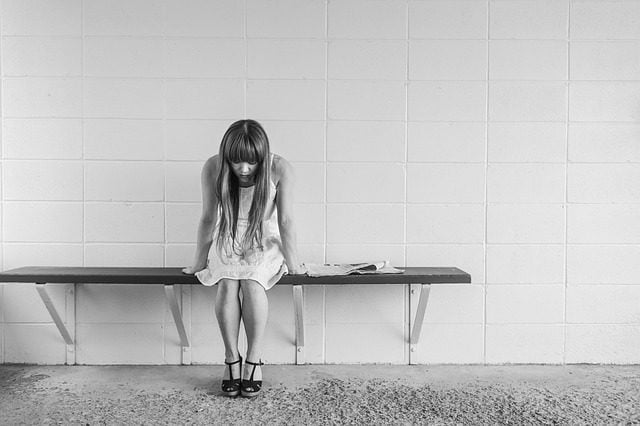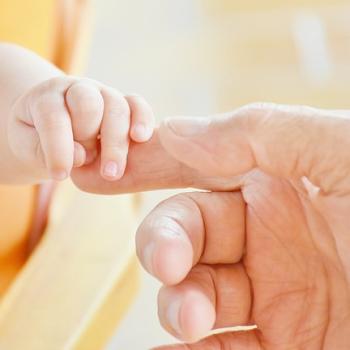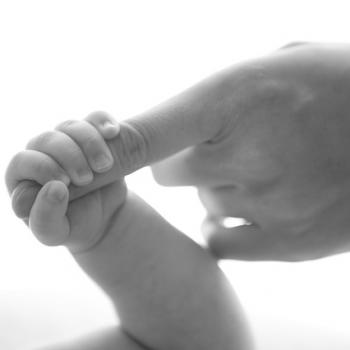
One of the first things I did when I found out that Rosie existed, was go to the local crisis pregnancy center.
I didn’t want an abortion. But I needed proof of pregnancy to get on Medicaid and see a doctor. And, since I had no insurance, I couldn’t go to a gynecologist for a signed statement that I was pregnant. I could have gone to the walk-in women’s health center with the sliding scale, but I didn’t even know that place existed. I would have thought I had to boycott it if I had, because it referred women to Planned Parenthood and I was against Planned Parenthood. Besides, I was Catholic. Most of the Catholics I knew donated to the crisis pregnancy center and revered it. I heard it was a helpful place. I decided to give it a go.
Mondays were billed as the free, confidential, no-obligation walk-in-pregnancy-test day. That sounded promising. I thought it meant I could walk in to the crisis pregnancy center, urinate in a cup, wait for the doctor or nurse’s diagnosis, give them my name for a proof of pregnancy statement, and head down to the Department of Job and Family Services to get on Medicaid.
As it turns out, that wasn’t what happened.
I walked into the crisis pregnancy center, already a little queasy at not quite six weeks, holding in my pee in anticipation of the test. The center was set up in a pretty old Victorian house in a rundown part of town; the interior didn’t look like a clinic but an antique furniture store. And there were no nurses on staff, only lay volunteers in breezy sun dresses. One of the lay volunteers was the receptionist, who welcomed me and directed me to a room upstairs to wait for another volunteer in another breezy sun dress.
The room upstairs was set up like a parlor with more expensive-looking antique furniture. The volunteer in the sun dress came into the room– to my surprise, not with a paper cup but with a clipboard for me to fill out.
I balked. “I thought this was confidential walk-in day?”
“It’s just for our files,” said the volunteer, gesturing to a large filing cabinet– the only object in the room that didn’t look like something out of a Dickens novel.
I didn’t want to be in their files. I had recently separated myself from an abusive living situation and been spiritually abused at Franciscan University, and I was spooked. I wasn’t interested in anyone finding out I was pregnant yet. I wanted to be in control of who knew. I didn’t know if crisis pregnancy centers were bound to the confidentiality laws that apply to real medical clinics (they are not). But I needed a pregnancy test, so I filled out the chart for their files. Full name. Address. Phone number.
“I recognize you from Church!” the volunteer said as I wrote. “I’ve seen you there on Sundays with your husband. IS that your husband?” And she named the parish and the time of the Mass. I thought that was odd. Wasn’t this confidential walk-in day? Shouldn’t they be treating me as a stranger and not doing anything to make me know I was known? Was it really tactful to ask about my marital status at a time like this?
I looked up into her eyes.
I wondered if I was just imagining it, or if there was something calculating behind her smile. As if she was identifying me on purpose so I’d realize that someone would notice, if I walked into Mass without a visible pregnancy later that year. Surely not.
I checked the box saying that I was not considering abortion, I just needed some assistance. I explained a little about my predicament. The volunteer frightened me very much by asking if my parents couldn’t do something to help me instead of my applying for Medicaid. I explained what I did not want to explain, that I wasn’t in contact with most of my family right now. The volunteer gave me another smile.
Finally, she produced the cup.
I held it between my legs in a ridiculously cramped Victorian bathroom crawling with gigantic-print flowered wallpaper. The room was so small, in order to sit on the toilet I practically had to knock my knees against the opposite wall. And on that wall, not at the normal height for a picture but directly at eye level for a person sitting down, was an oversized poster listing the most common sexually transmitted diseases, what they could do to me, and how condoms and diaphragms were completely ineffective to reduce my risk. Only abstinence would ensure that I stayed healthy.
I felt dirty and scrutinized as I washed my hands with expensive guest soap, with that paper cup of urine on a paper towel next to me.
Back in the parlor, the volunteer used the exact same pregnancy test I could have bought at Dollar Tree to decant three drops into a cartridge. She kept the cartridge next to her so I couldn’t see, and two minutes later she said the magic words: “Yes, you ARE pregnant.”
The volunteer handed me a card with the names of six doctors on it, most of them not on the bus route. “These are the Ob-gyns in the area who are pro-life and take Medicaid,” she said. And then she pitched me all of their services: a complimentary ultrasound on Wednesday, when an actual medical professional came to give ultrasounds. A scheme called “the Bridges Program,” where I could take birth and parenting classes in exchange for points which could be redeemed for gently used cribs, car seats and other items. The only free thing they offered without attendance at the Bridges Program was a bag of baby clothes presented to you after you gave birth.
“I just need proof of pregnancy to get on Medicaid,” I explained again.
As she filled out the proof of pregnancy form, I thought again and signed up for the ultrasound and the Bridges Program. I wanted a birthing class, and it would be nice to get free baby supplies.
A few weeks later, I got my official invitation to the Bridges Program. It was printed on a fancy flowered postcard as if it were an invitation to a party. That was when I found out that the Bridges Program only offered classes once a week, at one o’clock in the afternoon on Mondays. I was still trying to finish graduate school; I had a class at one o’clock on Mondays, so I couldn’t attend the Bridges Program. Pregnant teenagers had to be in high school at one o’clock on Mondays. Older pregnant women had to be at work at one o’clock on Mondays. I didn’t know who in the world would be available to take a parenting class at one o’clock on Mondays in order to earn a used crib.
I continued to get phone calls from the perfectly confidential no-obligation crisis pregnancy center every week for a few months, and I ignored them.
Now, here’s my question. For those of you who think that donating to a crisis pregnancy center is the answer to abortion: what do you think I would have done, after that visit to the crisis pregnancy center, if I’d been considering abortion? Do you think the crisis pregnancy center really would have changed my mind? Do you think that, if my mind had been changed, they really would have given me adequate help?
And what’s going to happen when abortion is illegal, in states where that happens? Particularly in states like Louisiana, where a law is being voted on which will allow prosecutors to charge post-abortive women with murder?
What if, instead of sending in a volunteer in a sun dress, the receptionist at the crisis pregnancy center had been able to direct me upstairs and then call the cops?
What if the volunteer had taken my personal information and then not been satisfied with how firmly I’d said I didn’t want abortion but just help? What if she had used that information to send the cops to my house? What if she had gossiped about me at my church and someone at church had not been satisfied with how fast my belly was growing, and called the cops?
What if they had had me arrested when I didn’t show up for the Bridges Program or answer the phone?
What if I had been terrified to go to the crisis pregnancy center for help, because I knew they could have me arrested?
Do you think that pregnant women in difficult circumstances will be MORE likely to trust pro-life volunteers in breezy sun dresses instead of a filthy illegal back alley abortion clinic, when abortion is officially a crime, and they know the pro-lifers themselves voted and campaigned to make it a crime? Will they be eager to trust people who put them in that kind of danger?
What will it do to the already inadequate resources available for pregnant women, the volunteers and the gently used cribs and the layettes and poorly timed classes, if it’s easier and cheaper to just have women arrested?
What do you think this will do to abortion rates? And as the rates go up, what will happen to those mothers?
Is that really what you want?
Steel Magnificat operates almost entirely on tips. To tip the author, visit our donate page.












